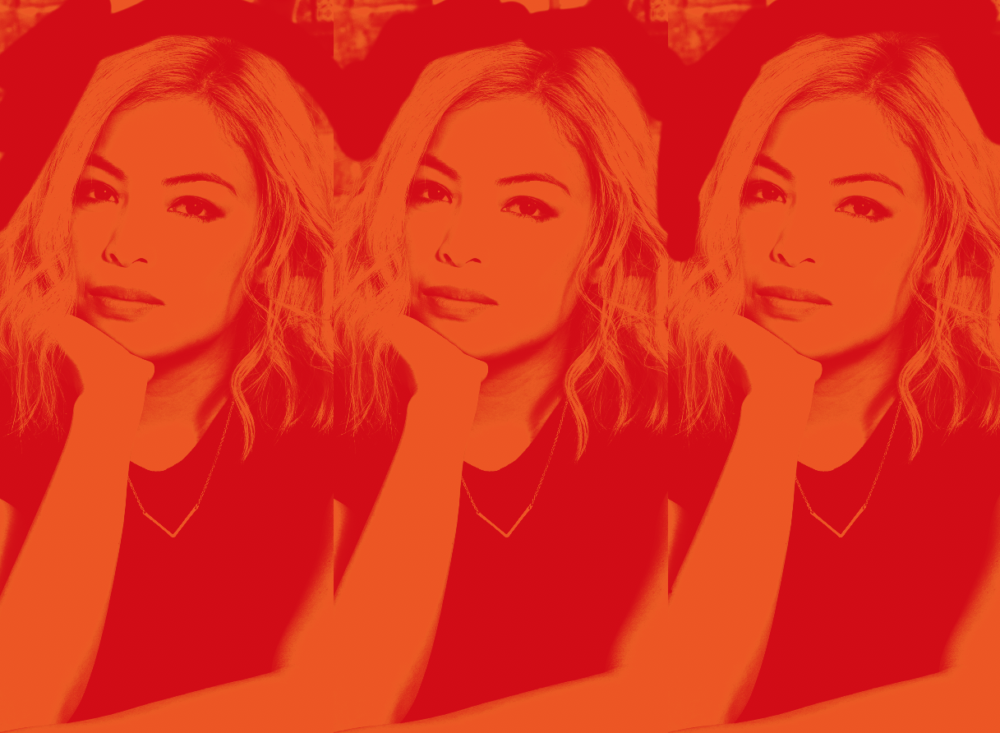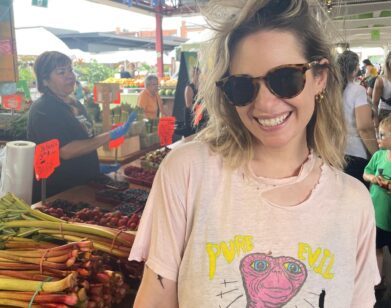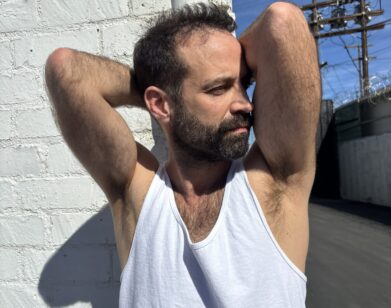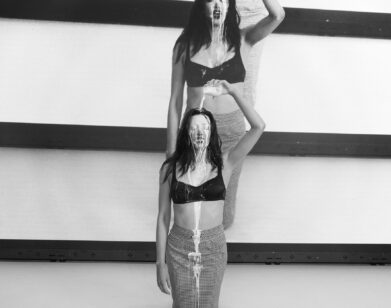Jia Tolentino Loves Getting High at Aquariums But Really Hates AirPods

Jia Tolentino loves a basic. “Long live the basic,” says the New Yorker’s resident millennial, whose lucid essays on subjects like the Juul craze, Lana Del Rey, and why everyone on Twitter seems to be asking celebrities to run them over, have cemented her as a singular voice of an internet-addled generation. Tolentino’s ability to unearth clarity amidst a mountain of late-capitalist clutter has never been more evident than in her new book, Trick Mirror: Reflections on Self-Delusion, a collection of critical essays that disentangle (and then tangle again) the knot of identity that emerges from an ever-confusing culture. From Sweetgreen to Pure Barre to the “I” in internet, Trick Mirror puts words to the pleasures and pitfalls of systems that sometimes swallow us whole. What separates Tolentino from her ilk is her decidedly youthful voice, one that embraces the eroticization of the barre class, the transcendent rapture of ecstasy, and the perverse joy of the Twitter scroll. When she delivers words out loud, as we found out from a recent conversation, she curses freely, rails against AirPods, and finds her muse in a beluga whale being serenaded by a mariachi band.
———
SARAH NECHAMKIN: Your writing has this unique way of merging a critical voice with an optimistic one. It’s a rare thing to be able to deliver such a sense of joy through cultural criticism.
JIA TOLENTINO: That makes me really happy, because I have been worried. I think that some people have had the opposite reaction. There aren’t any solutions proposed in this book, and it’s been throwing some people off. I was like, “Oh, shit. Did I not communicate that I still think it’s great to be alive, despite this book being about systems that seem intractably bad?” There’s a lot of joy in shitty things.
NECHAMKIN: I think it definitely came across, specifically in your essay about ecstasy, among other things. It communicated this bodily experience that is kind of the opposite of a lot of what our generation experiences on a daily basis—this yearning for physical pleasure.
TOLENTINO: I have a very consistent hunger for direct, physical experience as a way of understanding any subject. That part of me is extremely strong, desiring a lack of mediation. I mistrust the workings of my brain, but I don’t really mistrust the workings of my senses. Physical experience is unmediated in a way that almost nothing is about our world.
NECHAMKIN: That kind of presence feels increasingly rare, but you seem to be communicating that it’s still possible, or at least something worth pursuing.
TOLENTINO: Absolutely.
NECHAMKIN: Are you optimistic about the state of things?
TOLENTINO: I think I’m instinctually optimistic. I move through the world like someone that expects good things to happen, but I think that it’s an optimism predicated on a deep, deep sense that it’s all going to be a piece of shit anyways, so you might as well try your best. My expectations for life are extremely low, or nonexistent. Because they are so low, I’ve always just been like, “You’ve got to just move through with as much force and energy as you possibly can to see what you can make of this doom situation.” But it’s just like anybody right now looking at the climate forecast. I don’t know how anyone could really feel good about the future for that one isolated reason, let alone for all the others. But I have a really strong sense of, “We’re here for a tiny little blip.” Everything seems doomed. Because of that, I have an incredible lust to be alive, because it’s like, well, it doesn’t fucking matter, so you might as well just do a lot of shit and have fun.
NECHAMKIN: Do you think that’s what the drug stuff is about in your writing? When I was reading that essay, I was like, “Oh, fuck, I need to do that.” I don’t do a lot of drugs because I’m paranoid.
TOLENTINO: Oh, absolutely. Go do some Molly. Go do some Molly with a trustworthy friend. I’ve actually gotten a bunch of emails from people that were like, “I tried ecstasy for the first time after reading your essay.” All of them have been like, “I had a great time.”
NECHAMKIN: Oh, that’s good. No one was blaming you for hospital visits or anything like that?
TOLENTINO: Here’s the thing. It took me a long time to do acid, because I was like, “I’m scared of being high for nine hours. That seems horrible.” Then, me and my boyfriend both did it for the first time when we were in Iceland three years ago or something. It’s amazing, because the sun doesn’t go down, so you don’t get the scariness of, “Oh, it’s dark and I’m tripping.” But it was also like, you handled so much more shit in your life than getting a little crazy. At the time, I was 27. If a tree looks a little scary to me, do I really not think that I’m enough of a grown-up to be like, “That tree looks scary because you’re on acid,” and then go look at something else? It’s the same thing with Molly. I would say as long as you get it from a good source, there’s nothing to worry about.
NECHAMKIN: I feel like that is a uniquely important thing for writers to be able to access—to be able to awaken that natural instinct to look around at the world and be in it and be thinking about it and processing it. It feels like that instinct is almost being actively suppressed with Twitter—not only the thing itself but the whole culture surrounding it and the need to accrue followers. I know you’re super active on it. How do you balance that?
TOLENTINO: At the same time that I think the internet is a nightmare, I also know that I owe a lot of my career to it because I happen to have a personality that communicates very clearly on it. I have a kind of personality that the internet favors, which is someone that is extremely unguarded and probably naturally performative, to some degree.
NECHAMKIN: Like the fact that you were on a reality show.
TOLENTINO: Exactly. I’ve always taken to these things without a second thought. It doesn’t freak me out. How I think of it is to think about it as little as possible. I try to preserve my relationship to it to be pleasure-based. The only way around the sort of existential fuck of it is just for me to interact with it only to the degree that I’m having fun, and to stop when I’m not. And to remain fully aware that it’s bad and stupid.
NECHAMKIN: There’s this perversely fun strain of nihilism on Twitter. I don’t know what it is about Twitter specifically that engenders that, versus Instagram or any other platform.
TOLENTINO: I’ve always liked Instagram. It never gives me bad feelings because I don’t follow people that annoy me. Just dogs and national parks and stuff. But with Twitter, I have to use apps and Chrome plug-ins to keep me from bathing in the terrible feeling.
NECHAMKIN: I have to ask you about the cover photo on your Twitter page.
TOLENTINO: Aww! The mariachi beluga? Oh my god. It’s so special to me. It was a mariachi band that was playing for somebody’s wedding at an aquarium. I profiled Sam McKinniss, the painter, for the New Yorker once, and he was like, “Oh, that was my friend’s wedding.” Aquariums are so sick. One of my dream jobs is to be a copywriter for an aquarium. A mariachi band at an aquarium—that’s two of my favorite things in general. I grew up in Houston. I fucking love the mariachi band. It was one of those images that I just really had experienced this intense cathexis towards. You should watch the video on YouTube. The beluga’s just drifting. It’s everything I’ve ever wanted.
NECHAMKIN: That’s incredible.
TOLENTINO: And I don’t have that reaction to many things at all. I never look at something and identify with it. But, actually, the only two things on my Twitter—that beluga thing and then the Rosie Perez thing from Do the Right Thing in my bio—those are two of the only images that have ever appeared in front of me and I was like, “That’s how I’m trying to be.”
NECHAMKIN: Have you ever dropped acid in an aquarium?
TOLENTINO: No, but I definitely get high and go to the aquarium. My boyfriend and I used to live near the Houston Zoo, so we would get high and got to the zoo all the time, and it was great. If I have time to kill before going to the airport in the city, I love to go to the aquarium, get stoned, and look at jellyfish. Jellyfish really trip me out in general. Have you read that old New York Review of Books article about jellyfish? It’s the most interesting thing I’ve ever read in my life. Jellyfish can link together in numbers that will cover like a square mile of the ocean. Imagine that, a full square mile of jellyfish in the ocean. Fucking scary.
NECHAMKIN: Wow.
TOLENTINO: They can amass in such great numbers that they can sink ships and shut down Japanese power plants. But one thing that freaked me out so much was that there are immortal jellyfish. There are some jellyfish that reverse age. And if you cut it in half like a worm, the two parts will just continue to live forever. Then there’s another type of jellyfish that they don’t know whether to classify as a single organism or the group of them as an organism. They can’t tell the singular from the plural. That really fucked me up.
NECHAMKIN: That’s like this really weird metaphor for a lot of the themes that you write about—this idea of being an individual within mass culture.
TOLENTINO: Yeah, and at some point you can’t separate the individual completely.
NECHAMKIN: They should make a Pixar movie about a jellyfish clique.
TOLENTINO: Oh my god. That animation would be so tight. They need to do more under the sea stuff.
NECHAMKIN: There’s this line in your book about the distinct phenomenon that is Sweetgreen: “A marvel of optimization: a line of forty people—a texting, shuffling, eyes-down snake—can be processed in ten minutes, as customer after customer orders a kale Caesar with chicken without even looking at the other, darker-skinned, hairnet-wearing line of people who are busy adding chicken to kale Caesars as if it were their purpose in life to do so and their customers‘ purpose in life to send emails for sixteen hours a day with a brief break to snort down a bowl of nutrients that ward off the unhealthfulness of urban professional living.” How did you come up with that?
TOLENTINO: I worked next to a Sweetgreen. Gawker moved offices while I worked there, but both were next to Sweetgreens. I would go in and wait in this line and be on Slack the entire time working from the line. Then I would get the salad and work while I eat the salad. There was this particular uncanniness about that. Sometimes I would walk into Sweetgreen, and it would be like an earthquake happened in my brain, and, for a second, I’d be tripped out so hard about what was happening. It was that shift between it being just the most ordinary shit in the world and being something that would inculcate this incredible existential dread in me. And the fact that I kept going and having these shimmers of dread, I was like, “Okay, there’s something you have to figure out here.”
NECHAMKIN: I kind of feel that way about AirPods.
TOLENTINO: Oh, I hate AirPods. They’re a nightmare. With Google Glass, everyone had the self-respect to be like, “No. You look like a dork. We’re not allowing this in society.” But now we are allowing AirPods and Razor scooters, as if we have no self-respect. I have this sort of rude belief that people should try a little bit harder to be cool. Have some dignity, you know? If people were trying a little bit harder to be cool, then AirPods wouldn’t exist, and that would be better for all of us in general.
NECHAMKIN: I’ve been thinking a lot about that concept of being “basic.” What does that mean to you?
TOLENTINO: Long live the basic. Long live the person that isn’t constantly spiraling in this self-conscious existential nightmare and then going about being basic and living her life. There’s a huge part of me that’s actually incredibly basic. I was in a sorority. I was in an a cappella group. I went to frat parties. I’m super basic. And I think that’s fine. I love the basic.
NECHAMKIN: Do you think there’s such a thing as a basic bro?
TOLENTINO: Oh, yeah. So many of my friends are basic bros. I could argue that my partner is a basic bro. I am a bit of a basic bro.
NECHAMKIN: What bothers people so deeply about the concept of a “basic”?
TOLENTINO: My real point of view on the basic is that one of the things that has driven me nuts about feminism, that I have also played a part in by editing plenty of these essays myself, is that there’s this over-valorization of complication at the expense of someone that just wants to be fucking straight and married and do her thing. It’s assumed that it’s universal for women to be super conflicted, and actually, what basics have down is the acute ability to live.
NECHAMKIN: Is there anything else you would like to add?
TOLENTINO: No, it’s been great talking to you. I just want to bring up that jellyfish article and the beluga video again. I think you’ll enjoy both a lot.
NECHAMKIN: I did this interview with the musician Sudan Archives and she told me that she falls asleep to jellyfish YouTube videos because they’re so hypnotizing.
TOLENTINO: Wow, wow, wow. I should try that. Shit. I want to have one of those like LED grandma picture frames, and it’s all jellyfish. Maybe I should get an aquarium is where this is going.
NECHAMKIN: Have you ever had a pet fish?
TOLENTINO: No. I’d probably kill it. Maybe I’d get a lion jellyfish.
NECHAMKIN: But your dog is alive.
TOLENTINO: Yeah. My dog would eat the jellyfish and then die.






